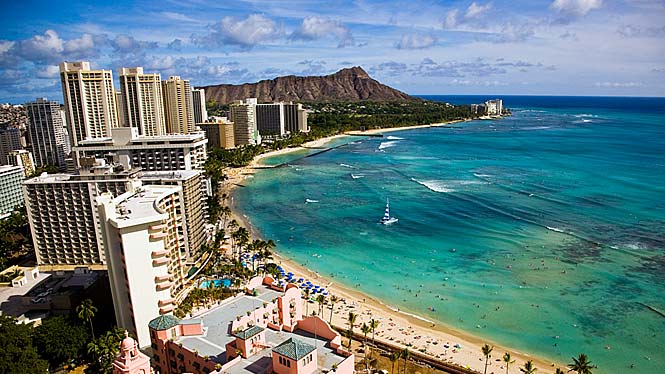Hawaii ‘ruined by climate change’ story may be misleading
 “Climate Change Will Ruin Hawaii” is a headline story getting a lot of attention currently because of a new study done for the state’s department of tourism. Though well done in most respects, it could be very misleading as it looks at the impact of climate change on Hawaii in absolute terms. The picture could be quite different when compared to other locations in relative terms. Consider:
“Climate Change Will Ruin Hawaii” is a headline story getting a lot of attention currently because of a new study done for the state’s department of tourism. Though well done in most respects, it could be very misleading as it looks at the impact of climate change on Hawaii in absolute terms. The picture could be quite different when compared to other locations in relative terms. Consider:
While low lying areas like present day Waikiki (pictured) will eventually be flooded as sea level rises, those volcanic islands rise steeply to higher elevations, allowing slow migration uphill, something that many ‘flat’ beachfront areas would envy — for example the Maldives, Miami, the Bahamas, Cancun — in fact the vast majority of beachfront tropical paradise locations do not have the security of moving to higher ground. (If that phrase sounds familiar to my readers, it’s the title of the last chapter of my book, High Tide On Main Street: Rising Sea Level and the Coming Coastal Crisis.”)
While the temperatures in Hawaii will likely warm, changing ecosystem and disease patterns, those islands are surrounded by the huge deep Pacific ocean which is less prone to warming than shallow seas like in Florida, the Gulf of Mexico, and some areas of the Caribbean. As a result Hawaii’s temperatures may rise 40% less than inland continental areas. (Few recognize that the usual temperatures quoted for the planet and climate change are AVERAGE global temperature. Typically ocean temperatures will be about 40% below the average and inland continental temperature about 40% higher than the average.)
Hawaii is also blessed with enough land for agriculture, good climate, and decent fresh water resources that it could endure global warming better than many areas in terms of dealing with its own needs for fresh water and food supply.
The ocean acidification will probably damage the reefs and marine ecosystem, but again, perhaps less than many other marine based areas.
So, Hawaii should be concerned, but all things considered, they may manage through this huge challenge of changing climate (a/k/a global warming) better than many other locations.
